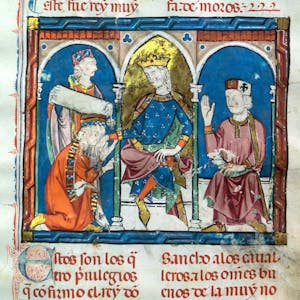This course delves into the medieval history of Toledo, encompassing the era of the Visigoth Kingdom, Islamic period, and reintegration into Christian Spain. It scrutinizes the cultural and religious transformations, coexistence of different peoples and religions, and the significant historical figures shaping the city's narrative.
The comprehensive modules cover key aspects such as the Islamic conquest, resurgent Christian kingdoms, convivencia, and the role of archives and paleography in understanding the historical context. Participants will gain valuable insights into the complex interrelations between Jews, Christians, and Muslims during this transformative period in Spanish history.
Certificate Available ✔
Get Started / More Info
This course comprises eight modules that delve into the historical and cultural intricacies of Toledo, covering topics such as the Visigoth Kingdom, Islamic conquest, convivencia, and the role of archives and paleography in understanding medieval Spain.
Module 1 provides an introduction to the course, offering an overview of the historical context and the significance of studying medieval Spain. Participants will explore the key elements of the course, the historical overview of Roman Hispania, and the transition from Roman rule to the Visigothic Kingdom.
Module 2 delves into the interrelations between Jews, Christians, and Muslims in medieval Toledo until 1212 CE, encompassing the Islamic conquest, resurgent Christian kingdoms, and the complexities of the Reconquista. Participants will gain insights into the cultural and historical dynamics that shaped Toledo during this period.
Module 3 focuses on the period after 1212 CE, examining the coexistence of Catholic Spain and the Nasrids, the cultural backlash, and the impact of historical events such as the Plague and the Spanish Inquisition. Participants will explore the role of material culture and the expulsion of Jewish and Muslim communities from Spain.
Module 4 introduces participants to archives and paleography, providing an understanding of the Archivo Municipal de Toledo and the Archivo Historico de la Nobleza. It offers insights into the significance of paleography in deciphering historical manuscripts and documents.
Module 5 offers participants the opportunity to choose a level of difficulty in learning paleography, providing resources for introductory, intermediate, and advanced paleography. It equips learners with the necessary skills to interpret historical manuscripts.
Module 6 provides an in-depth understanding of the SILReST Paleography Method for 15th Century Manuscripts, offering essential transcription strategies and a comprehensive overview of the method. Participants will engage in problem-solving exercises to enhance their paleography skills.
Module 7 focuses on the global team at work, engaging participants in transcription and interpretation projects. It offers insights into working with 18th-19th century manuscripts, 13th-century manuscripts, and 14th-15th century manuscripts, providing a comprehensive understanding of historical documentation.
Module 8 expands on the transcription and interpretation projects, offering participants the opportunity to engage with different types of historical manuscripts. It provides a practical and immersive learning experience, allowing participants to apply their paleography skills to diverse historical documents.
Explore the origins of the Mediterranean Civilization through the lens of archaeology, uncovering the deep roots of cultural exchange and the evolution of early...
Indigenous Canada is an eye-opening exploration of Indigenous history and contemporary perspectives in Canada, delving into complex experiences from an Indigenous...
Explore the origins, evolution, and implementation of the "Final Solution to the Jewish Question" during World War II, delving into the complex nature...
The History of Modern Israel - Part II: Challenges of Israel as a sovereign state is a comprehensive examination of Israeli politics, economy, society, and culture...